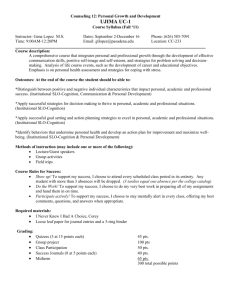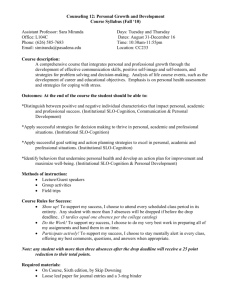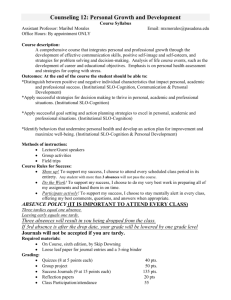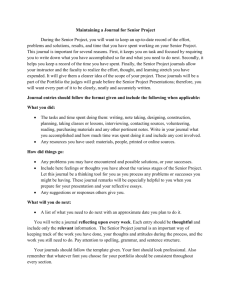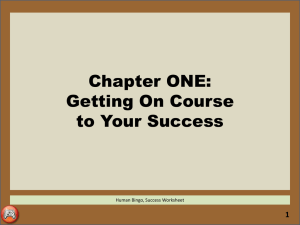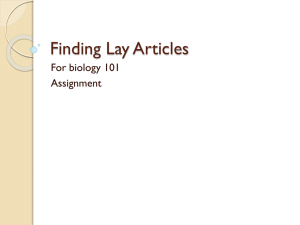SYLLABUS FOR A STUDENT SUCCESS COURSE
advertisement
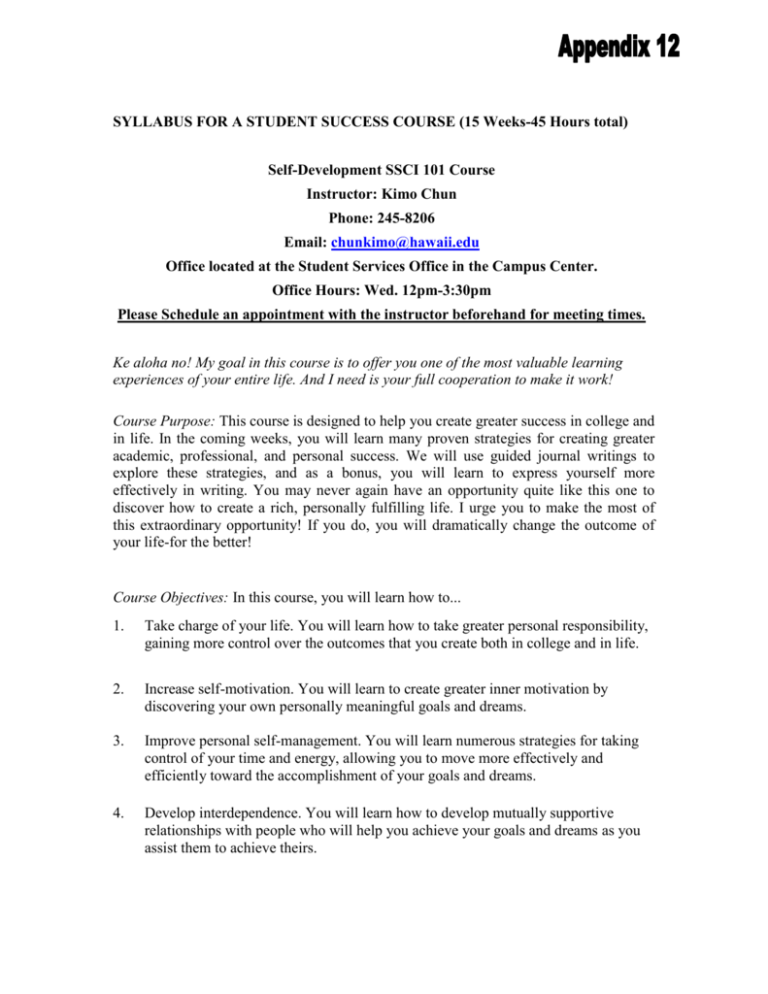
SYLLABUS FOR A STUDENT SUCCESS COURSE (15 Weeks-45 Hours total) Self-Development SSCI 101 Course Instructor: Kimo Chun Phone: 245-8206 Email: chunkimo@hawaii.edu Office located at the Student Services Office in the Campus Center. Office Hours: Wed. 12pm-3:30pm Please Schedule an appointment with the instructor beforehand for meeting times. Ke aloha no! My goal in this course is to offer you one of the most valuable learning experiences of your entire life. And I need is your full cooperation to make it work! Course Purpose: This course is designed to help you create greater success in college and in life. In the coming weeks, you will learn many proven strategies for creating greater academic, professional, and personal success. We will use guided journal writings to explore these strategies, and as a bonus, you will learn to express yourself more effectively in writing. You may never again have an opportunity quite like this one to discover how to create a rich, personally fulfilling life. I urge you to make the most of this extraordinary opportunity! If you do, you will dramatically change the outcome of your life-for the better! Course Objectives: In this course, you will learn how to... 1. Take charge of your life. You will learn how to take greater personal responsibility, gaining more control over the outcomes that you create both in college and in life. 2. Increase self-motivation. You will learn to create greater inner motivation by discovering your own personally meaningful goals and dreams. 3. Improve personal self-management. You will learn numerous strategies for taking control of your time and energy, allowing you to move more effectively and efficiently toward the accomplishment of your goals and dreams. 4. Develop interdependence. You will learn how to develop mutually supportive relationships with people who will help you achieve your goals and dreams as you assist them to achieve theirs. 5. Increase self-awareness. You will learn how to understand and revise your selfdefeating patterns of behavior, thought, and emotion as well as your unconscious limiting beliefs. 6. Maximize your learning. You will discover the natural process of effective learning and understand how to apply that process according to your individual learning style preference. This knowledge will enable you not only to get better grades in college but also to be a more effective lifelong learner. 7. Develop emotional intelligence. You will learn effective strategies for managing your emotional life, decreasing stress and distress while increasing your inner sense of well-being. Raise your self-esteem. You will learn how to develop self-acceptance, selfconfidence, self-respect, self-love, and unconditional self-worth. 8. 9. Write more effectively. You will learn how to improve your writing skills through the extensive writing practice offered by your guided journal entries. 10. Improve creative and critical thinking skills. You will learn how to enhance the thinking skills essential for analyzing and solving problems in your academic, professional, and personal lives. 11. Master effective study skills. You will learn how to raise your grades in college by improving essential skills like reading, note taking, memorizing, studying, and test taking. Course Supplies: 1. On Course, 4th Edition, by Skip Downing 2. String-bound composition notebook (or computer, disk and 3-ring binder) Method: By reading On Course (our textbook), you'll learn empowering strategies that have helped others create great success. By keeping a guided journal, you'll discover how to apply these success strategies to achieve your own goals and dreams. By participating in class activities and focused conversations, and by completing a course project, you will further improve your ability to stay on course to your success. Once you make these new strategies your own through application, you'll have the ability to dramatically improve the outcome of your life-academically, professionally, and personally. Course Grades: Percentage A = 90%-100% B = 80%-89% C = 70%-79% D = 60%-69% F = 59% or below Course Projects: 1. 2. 3. 4. 6. 7. 8. 15 Informational Festival (5 points each) 31 Success Journals (5 points each) 1 Cultural Development Essay 1 Ho`ike- Final Group Presentation Participation Attendance In-Class Assignments Total Possible Percentage 15% 20% 20% 15% 10% 10% 10% 100% Each of the 8 components of your grade is explained below. 1. Informational Festival (15% of final grade) This is a course for students who wish to be successful in college and in life. One of the most important factors of success in any endeavor is consistent and active participation. To encourage and reward your preparation for active participation at every class, fifteen unannounced informational festivals on the readings will be given. If you have read the assignment and completed your journal entry, you should have no trouble earning the maximum points (5) for each festival. No festival may be made up. Great success is created one small step at a time. Each time that you earn your festival points you take an important step toward your success in this course ... and in life! 2. Success Journals (20% of final grade) Your SUCCESS JOURNAL provides an opportunity to explore your thoughts and feelings as you experiment with the success strategies presented in On Course. By carefully examining each strategy in your journal, you will discover which ones will assist you to create a rich, personally fulfilling life. Although I will be collecting your journals and looking through them, write your journal for yourself, not for me. Your journal entries will occasionally be read by your classmates. Journal Writings: During this semester, you will write in your composition notebook thirty-one numbered journal entries from our textbook. These entries will be written outside of class. Additionally, you will write occasional lettered journal entries based on class exercises. These entries will be written in class. At various times you will have an opportunity to read a journal entry to one or more classmates. THEREFORE, PLEASE BRING YOUR TEXTBOOK AND JOURNAL TO EVERY CLASS. Note: If you wish, you may write the first draft of journal entries on loose sheets of paper, but all journal entries must be written in the composition notebook when it is handed in for evaluation. Or if you choose to write your journal on a computer, you will print hardcopies of all entries and bring them to class neatly organized in a 3-ring binder. This requirement will assure that none of your entries gets lost. At the end of this semester, you will have your entire journal to keep for years to come. Many students come to regard their personal journal as one of their most valued possessions. Journal Evaluations: I will collect your journals weekly. You may pick up your journal in front of my office forty-eight hours later. It is not my intention to read every journal entry you write. Instead, I will look through your journal book to verify the completion of each assignment and to give credit for a job well done. I read occasional journal entries to get a sense of the issues you are working on. With this knowledge I can be of greater assistance to you this semester. If you want my comment on a specific part of your journal, simply turn down the corner of the appropriate page. On that page, write a note about the response you desire from me. Privacy: Occasionally you may write a journal entry that you wish to keep private. If so, simply fold the appropriate pages over and staple them closed at the top and bottom. You have my word that I will respect your privacy. I do reserve the right to confirm that there is, in fact, writing on these pages. You may lock up to three journal entries; more than that will require my permission. Locked journals will be given scores equal to the average score of all other journals. Journal Points: Each journal entry will be awarded up to 5 points. Thus, all thirty-one journal entries will be worth a possible total of 155 points. A journal entry will be awarded the maximum of 5 points if it fulfills the following two criteria: 1. The entry is complete (all steps in the directions have been responded to), and 2. The entry is written with high standards (an obvious attempt has been made to dive deep). Grammar, spelling, and punctuation will NOT be factors in awarding points in this journal. You are free to express yourself without concern for standard English conventions. IMPORTANT NOTE: All thirty-one numbered journal entries must be completed to earn a passing grade in the course. 3. Cultural Development Essay (20 % of final grade) The purpose of your essay is for you to identify with your Hawaiian Heritage. This essay is your opportunity to write the script that will keep you on course to a rich, personally fulfilling life! This paper will vary between 3-5 pages with 1 “ margins, and 12 font. You will also include a bibliography with at least 5 resources of which 3 will be from different types of resources. .(ex.Periodicals/ Magazine, Texts, Internet, Interviews,& Newspaper Articles) An "A" paper will ... 1. Demonstrate the writer's careful consideration and investigation of Hawaiian Culture. Topics will include, however will not be limited to significant place 2. 3. names, music, chant, sport, arts, protocols, etc. . Contain extensive support (examples, experiences, evidence, and/or explanation) for your chosen topic. Show a commitment to excellence in preparation, including professional appearance and a command of standard English. 4. Each paper should be accompanied with an appropriate visual aid. In other words the visual aid needs to be connected to the essay topic. Visual aids can range from video, story-board, Power-Point, and artwork. 4. Final Group Presentation (15 % of final grade) The instructor will organize the class in groups of 3-4 students. The activity is simply this, “By any means possible please uncover for me your idea of The Great Students.” 5. Participation (10% of final grade) Students are required to participate in all class discussions. 6. Attendance (10% of final grade) Since the class meets once a week, attendance is carefully monitored, and crucial to a successful completion of the course. If you are unable to attend, pleas make it a point to contact the instructor before hand. Course Rules for Success To create the very best environment for supporting your success and the success of your classmates, this course has three important rules. The more challenging these rules are for you, the more value you will experience by adopting them. By choosing to follow these three rules, you are choosing to be successful not only in this course but in your life. These rules will support your success in every goal you pursue! 1. Show up & be prompt! To support my success, I choose to attend every scheduled class period in its entirety. 2. 3. 4. 5. Do the work! To support my success, I choose to do my very best work in preparing all of my assignments and hand them in on time. Participate actively! To support my success, I choose to stay mentally alert in every class, offering my best comments, questions, and answers when appropriate. Each student must meet with a writing tutor in the Learning Resource Center on the final paper at least once during the semester. Each student must meet with the instructor for a mid-term evaluation. Students are responsible for scheduling meeting times. Schedule of Assignments REMINDER: Fifteen unannounced informational festivals will be given. No festivals may be made up. Assignments below are due at the first class of the week in which they are due. Bring your textbook and journal to every class. Week 1: Week 2: Week 3: Week 4: Week 5: Week 6: Week 7: Week 8: Week 9: Week 10: Week 11: Week 12: Week 13: Week 14: Week 15: On Course: Read/Write Journal #1 Read: Learning College Customs On Course: Read/Write Journals #2 and 3 On Course: Read/Write Journals #4 and 5 Read: Effective Writing On Course: Read/Write Journals #6, 7, and 8 On Course: Read/Write Journals #9 and 10 Read: Effective Money Management On Course: Read/Write Journals #11, 12, and 13 On Course: Read/Write Journals #14 and 15 Read: Effective Reading On Course: Read/Write Journals #16, 17, and 18 On Course: Read/Write Journals #19 and 20 Read: Effective Note Taking On Course: Read/Write Journals #21, 22, and 23 On Course: Read/Write Journals #24 and 25 Read: Effective Memorizing On Course: Read/Write Journals #26, 27, and 28 On Course: Read/Write Journals #29 and 30 Read: Effective Studying On Course: Read/Write Journal #31 Read: Effective Test Taking "Philosophy of Success" Essay Due * Schedule of topics subject to change. If you have a disability and have not voluntarily disclosed the nature of your disability and the support that you need, your invited to contact the Students Services Office , 245-8314

